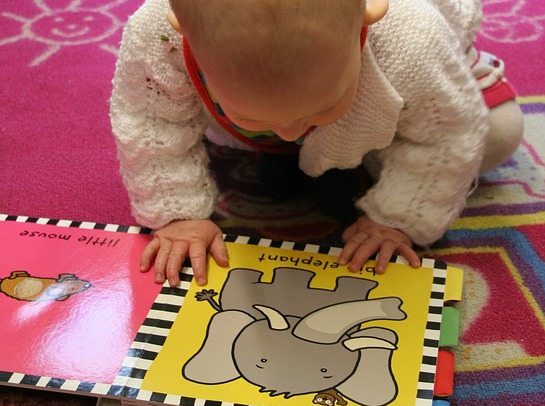English is the official language in over 50 countries. It is estimated that over 1.5 billion people around the world speak English. You know that English is an important language in the global community, but maybe you don’t think that it is important to teach it to your young children. Think again. In fact, you should teach your kids English as early as possible.
There are numerous benefits of learning English at a young age, so get started today! We’ve compiled some great resources to help you.

Why – and How – to Teach Your Kids English Now!
Most kids will learn English at school anyway, so why should you take the time to teach your children English at home? There are lots of reasons!
Teach your kids English to get ahead of the curve
Most children start learning English in middle or even high school, between the ages of 10 and 14. At this point, they learn languages in a formal setting, and grades are the sole motivator to excel. Homework, tests, and grades (results-focused learning) can actually discourage children from language learning. Often, classroom methods favor one or two learning styles and leave out children who learn best through tactical or physical exercises. This is where getting an early start is essential. When you teach kids English through play, songs, or relatable cartoon characters in a comfortable and low-pressure environment, they develop a genuine interest in language rather than one based on test results. This curiosity translates to excellence in the classroom later on.
Not only this, but studies have shown many benefits to teaching young children a second language. A study by the Cornell Language Acquisition Lab found that children who know a second language have longer attention spans and are able to block out distractions more easily than those who only speak their native language. These skills are indispensable in school and later in life.
Children who learn English at a young age will also be more open to new people and cultures, and will undoubtedly have more career opportunities in the future thanks to their language skills.
As Easy as One, Two Three
Now that you know the benefits of teaching your kids English, it’s time to get to work. It’s easier than you might think.
Science is on your side
In terms of when to start to teach your kids English, most experts say as early as possible. A University of Washington study explains that babies are able to differentiate between more sounds than adults, and therefore are likely to develop native-like English pronunciation if exposed to a foreign language. In general, kids absorb information easily. When they are in the process of learning their native language, they can pick up another language with little effort.
Studies have shown that one of the keys to learning any language is repetition. Luckily, many kids’ games and songs lend themselves well to this strategy. Combine word repetition with hand gestures, with a song like Head, Shoulders, Knees and Toes. Your kids will have fun performing for friends and family!
Motivation
Keeping your kids motivated to learn English is the biggest factor of their success. As we mentioned before, young children don’t have to worry about grades and tests during their language learning. Kids are often self-motivated because they associate learning English with fun: playing games, singing songs, or watching TV shows they enjoy.
Easy motivation isn’t limited to elementary children, though. Older kids who have begun learning English in school can also find motivation outside of academics. Help your child find a penpal in an English-speaking country, or practice vocabulary with them for an upcoming family vacation.
Ready to get started? Read on!
How to Teach Your Kids English
It is important to make learning English fun for your kids, or they will quickly lose interest. There are things parents can do both inside and outside the home to get your children excited about English.
Teach your kids English at home
Here are some activities you and your child can do together to introduce English in the home, regardless of your own level of English.
- Get hands-on. Try making traditional British and American treats with your kids using recipes in English. Write English words for household items like the television and the refrigerator on sticky notes and have a scavenger hunt. Learn about and celebrate holidays like Thanksgiving or Halloween.
- Routine, routine, routine. Incorporate English into your child’s daily routines. Stock up on English books and nursery rhymes to read or listen to before bed. Include your child in your daily MosaLingua review session. Strategic repetition is extremely important for building long-term memory in both kids and adults.
- Bring in an expert. If you have a spare bedroom, consider hiring a nanny, au pair, or international student from an English-speaking country to teach your kids English. Your child will get authentic exposure to English on a daily basis, and you will get a break from babysitting!
Check out British Council’s LearnEnglish Kids and LearnEnglish Teens webpages for even more activity ideas and motivation tools.
And speaking of your own level of English… If you want to find out where you stand, take the MosaLingua self-assessment:
Find out your level of English
Provide exposure away from home
If you can, think about sending your kids to an English immersion camp or school. There are opportunities all over the world to expose your children to English in an immersive environment. Children will be able to meet peers with similar interests and learn English through play.
For younger children, summer camps close to home are a great option. If you live in France, check out American and British Village camps. Alpadia Language Schools offer English immersion camps in Switzerland, Germany, and England. The Spanish company Forenex has English camp options for kids aged 4-17.
International and English-immersion schools are another great option. These schools often provide summer opportunities so that your child can keep learning English even when school isn’t in session. Learn4Good has a comprehensive listing of international schools and schools around the world that use American, British, and Canadian curriculum.
More Tips from Luca
Luca has lots of experience teaching languages to his own children. His oldest son, who just recently started going to school, already knows three languages! Watch this video (right here, or on our YouTube channel) for more tips on how to successfully teach a language to your children. The video is in English, but there are subtitles in six languages if you need them.
Make sure to subscribe to our channel for more language learning tips and information!
Now that you have the knowledge and tools needed to teach your kids English, what are you waiting for?







Comments